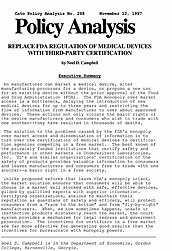The solution to the problems caused by the FDA’s monopoly over market access and dissemination of information is to turn over the certification of medical devices to certification agencies competing in a free market. The best known of the privately funded institutions that certify safety and performance in other markets is Underwriters Laboratories, Inc. UL’s and similar organizations’ certification of the safety of products provides valuable information to consumers and leaves manufacturers and consumers free to trade with one another–a basic right in a free society.
Unlike proposed reforms that leave FDA’s monopoly intact, the market solution ensures that consumers will be able to choose in a market well stocked with safe, effective devices, guided by qualified experts with superior information. Certifying organizations, anxious to maintain their reputation as guardians of safety and efficacy, will protect consumers from a “race to the bottom” and from “fly-by-night” manufacturers. When, as now sometimes happens, unsafe or ineffective products mistakenly reach the market, the court system provides a mechanism for legal redress and government prosecution. The incentives for certifiers in a free market are far more effective for generating good results than the incentives for bureaucrats with monopoly powers.

